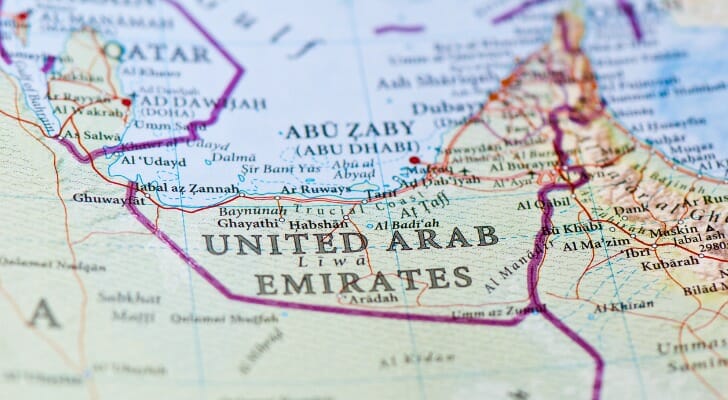Once organized as separate sheikdoms, the seven emirates of the United Arab Emirates, Abu Dhabi, Ajman, Dubai, Fujairah, Ras Al-Khaimah, Sharjah and Umm Al-Quwain, are now a popular destination for expatriates. In fact, according to the Congressional Research Service, around 90% of the UAE’s almost 10 million population is made up of expatriates. While the majority of them are there to work in its open economy, many would like to retire there. The UAE boasts warm weather, glamor and new programs to encourage retirement there. But no country is perfect, and the UAE is no exception.
Consider working with a financial advisor if you want to retire abroad.
Retiring in the United Arab Emirates: Cost of Living and Housing
It is possible to live in the United Arab Emirates at a more affordable price than you’re now facing. According to Feb. 2023 data from Numbeo, a cost-of-living database, the UAE’s cost of living is 17.8% lower on average than in the United States. Looking at rent, it sits around 26.2% lower than rates in the U.S..
Dubai, the capital of the Emirate of Dubai, is currently the most populated city at over three million. Chicago in Illinois has a comparable population, according to the U.S. Census Bureau. Putting the two side by side, approximately $5,172 in Dubai would get you the same standard of living as $6,271 in Chicago.
That carries over into the price to rent or purchase an apartment. A one-bedroom apartment in the city center costs about $1,864.82 in Dubai, whereas it’s $2,000.35 in Chicago. Outside the center, that drops to $1,070.06 for Dubai, compared to Chicago’s $1,438.85. If you would rather buy, it’s approximately $374.08 and $222.55 per square foot inside and outside the city center, respectively, for Dubai, compared to $382.14 and $254.50 in Chicago.
As of Jan. 2023, the average U.S. retiree receives $1,825 per month in Social Security retirement benefits. The UAE is one of the more affordable locations to retire abroad on this allowance. However, that varies with the lifestyle you want as well as other details.
Retiring in the United Arab Emirates: Visas and Residence Permit
The UAE is taking measures to make it easier to retire in the country. The Department of Tourism and Commerce Marketing (Dubai Tourism) joined efforts with the General Directorate of Residency and Foreigners Affairs (GDFRA-Dubai) to create the Retire in Dubai program. It’s a globally geared program designed to allow long-term working expatriates, as well as other foreign retirees, to retire in the UAE .
Candidates receive a retirement visa, which is renewable every five years. To earn it, you can choose one of three requirements to prove your financial eligibility:
- Show that you have a monthly income of or more than AED20,000 (around $5,400)
- Prove that you have savings evaluated at AED1 million (around $272,000)
- Or, own property in Dubai that is worth AED2 million (around $545,000)
The program is open to resident expatriates and foreign retirees over the age of 55 who hold valid UAE health insurance.
Retiring in the United Arab Emirates: Healthcare

The UAE health service is a well-funded and rapidly growing sector. It’s run on both a federate and emirate level, with measures in place to continue improving. It is required for retirees in the UAE to purchase private health insurance. Expatriates do not have access to the country’s free public health services. Only certain health insurance policies qualify for the UAE retirement visa. If you feel like the UAE might be the right destination for you, ensure that your policy qualifies.
Some of the health insurance packages that meet the visa’s requirements include those from Alliance and Abu Dhabi National Insurance Company (ADNIC).
Retiring in the United Arab Emirates: Taxes
The United Arab Emirates is a unique country when it comes to its taxation system. There is no federal income tax. So, individuals do not have to pay part of their income to the government. It levies some corporate tax, but only on oil companies and certain finance institutions.
Additionally, a value added tax (VAT) was introduced by the UAE in 2018 at 5%. This is essentially a flat tax added at every point in the manufacturing-to-sales process. There are also excise taxes on specific products considered harmful to humans, such as tobacco and energy drinks. Like this, there are few taxes an expat needs to worry about for life in the UAE.
Regardless, as a U.S. expat, you are still required to file taxes with the U.S. government. It’s best to consult a financial advisor or one who works with expatriates. They can help you navigate the annual process to file your U.S. expat tax return.
Retiring in the United Arab Emirates: Safety
There are safety concerns to take into account if you want to move to the UAE. Firstly, you may be at risk simply for being an American. Terrorist groups in the region are still a pressing issue. The U.S. Department of State warns that members in these groups target high volumes of vulnerable people. So, it’s important to exercise caution whether you’re at a public event, restaurant, mall or even place of worship.
In addition, women have an increased chance to experience harassment. Women should be careful when walking alone or taking public transport. In particular, taxis can be a hot spot for sexual assault or harassment. Alternatively, there are taxis driven by women for exclusive female use. It may be better to use these, which you can find by their pink roofs.
There are also human rights concerns, as reported by the U.S. government and several human rights activist groups. Some that may affect you include internet use restrictions, freedom of press and speech censorship and extended detention without charges.
Retiring in the United Arab Emirates: Religion and Culture
Islam is the Emirates’ official religion and about 90% of Muslims are Sunni and 10% are Shia. Conversion from Islam is not allowed. Non-Muslim women may marry Muslim men, but Muslim women may not marry non-Muslim men. Christians, whether Eastern Orthodox, Oriental Orthodox (Coptic), Roman Catholic or Protestant, are free to hold worship services. Mormons are also free to hold worship services and have received permission to build a temple in Dubai, which will be the first such building in the Middle East.
Women do not have to cover their heads, faces and hair in public. However – especially outside the main city of Dubai – it’s wise to be cognizant of the comparatively conservative cultural sensibilities of Emiratis, especially as they relate to women’s attire.
Bottom Line

The United Arab Emirates is an increasingly popular destination, regardless of one’s age. The UAE is also taking steps to make it a top contender for foreign expats to retire. With the lack of an income tax and a comparable cost of living, it’s a tempting possibility. But there may be better options out there. Other countries offer equal or cheaper prices to purchase property. On top of that, there are a few safety and civil liberty concerns that the American expat has to consider.
Tips for Achieving Your Retirement Goals
- Traveling abroad is an expense in itself. But retiring outside the country comes with another laundry list of costs. Some of the most important involve your yearly taxes, as well as retirement income planning, all of which a financial advisor can help with. Finding a financial advisor doesn’t have to be hard. SmartAsset’s free tool matches you with up to three vetted financial advisors who serve your area, and you can interview your advisor matches at no cost to decide which one is right for you. If you’re ready to find an advisor who can help you achieve your financial goals, get started now.
- The United Arab Emirates may have a lower cost of living than the U.S., but you’ll still have to live on a certain amount of money as an expatriate there. Like many other countries, you can check to see the average monthly budget for the UAE. You can use SmartAsset’s retirement calculator to check whether you’ll be able to pay that minimum in the future. It only requires a few details to find out if you are saving enough.
Photo credit: ©iStock.com/JandaliPhoto, ©iStock.com/goralikus, ©iStock.com/SHansche
